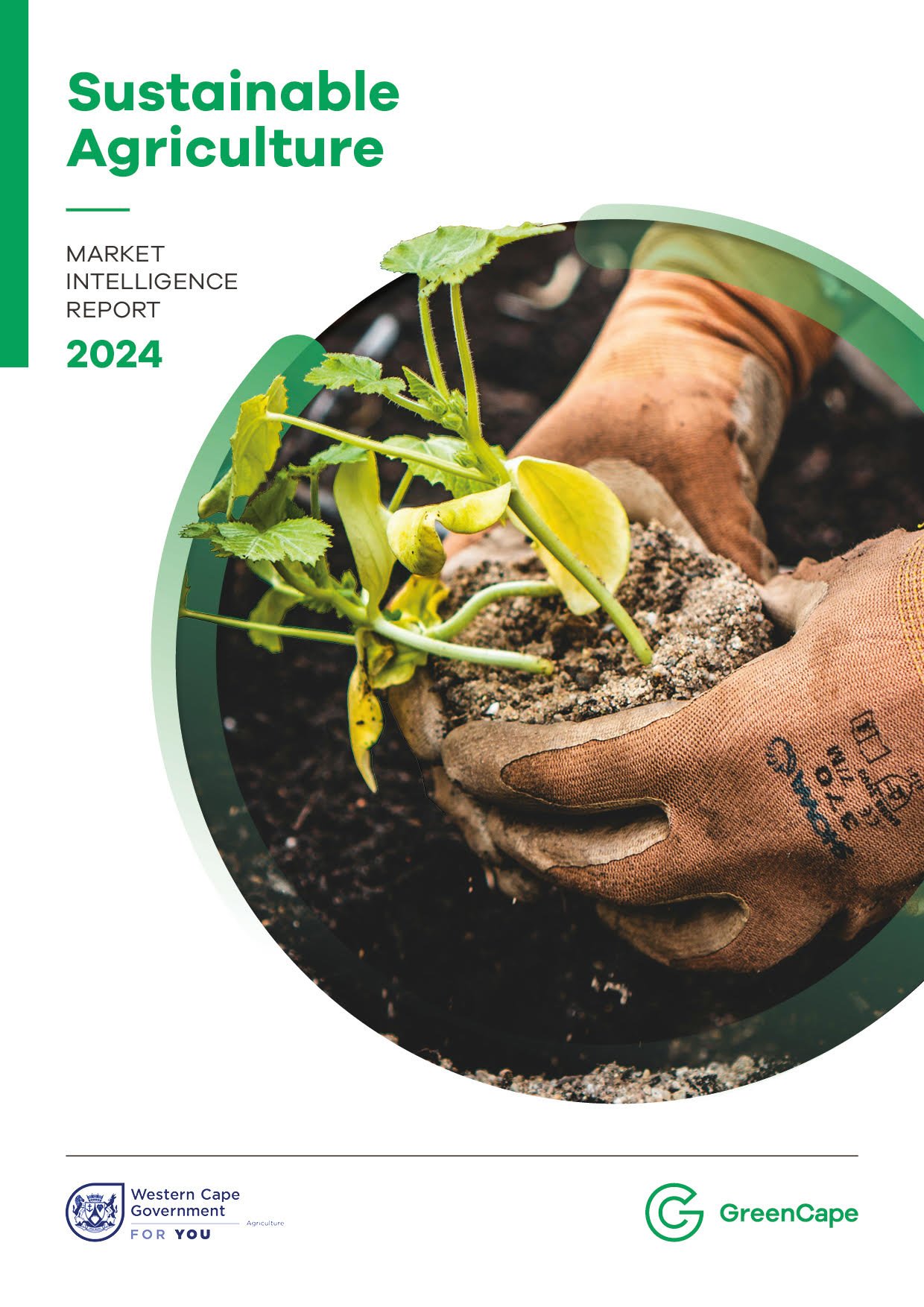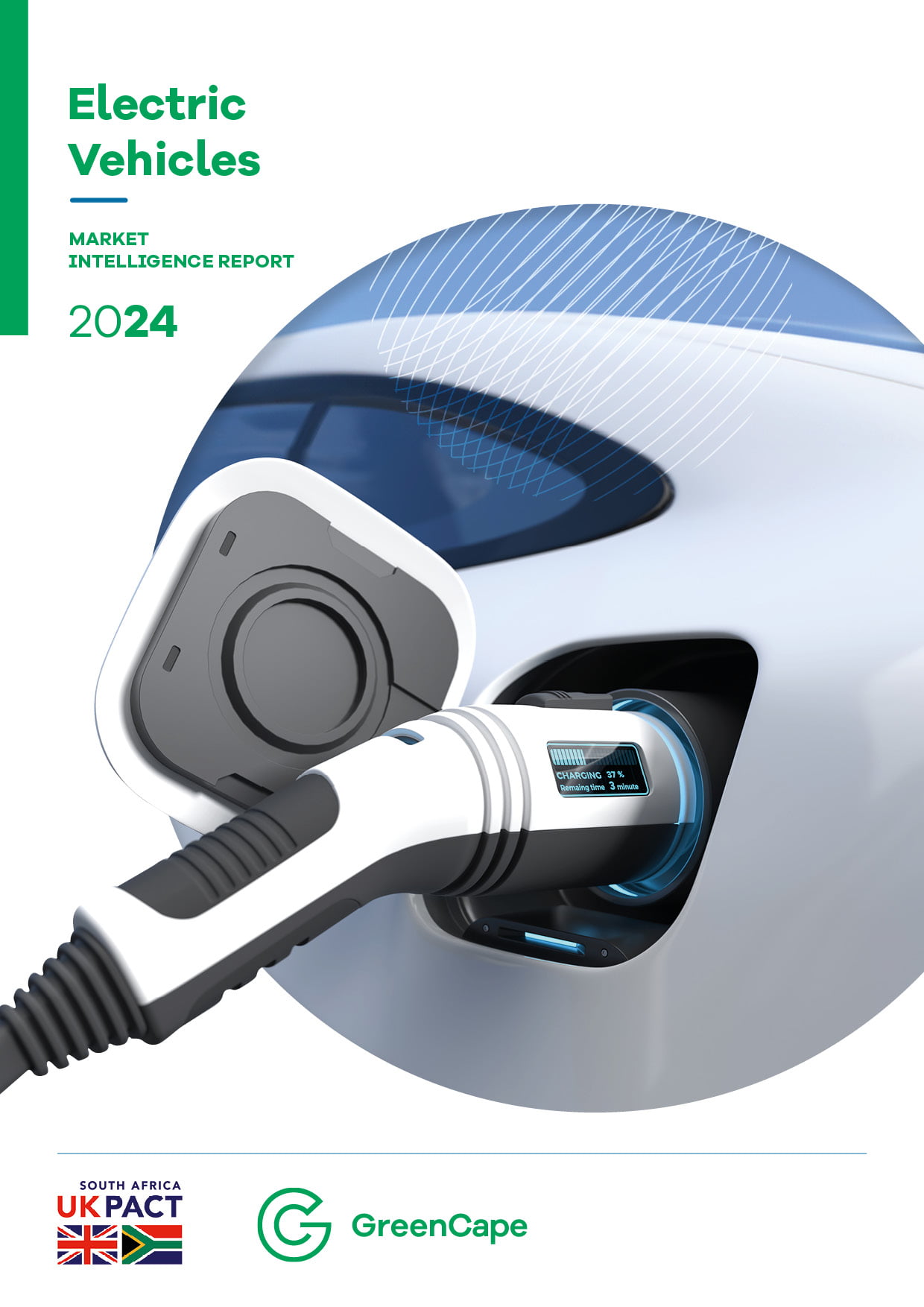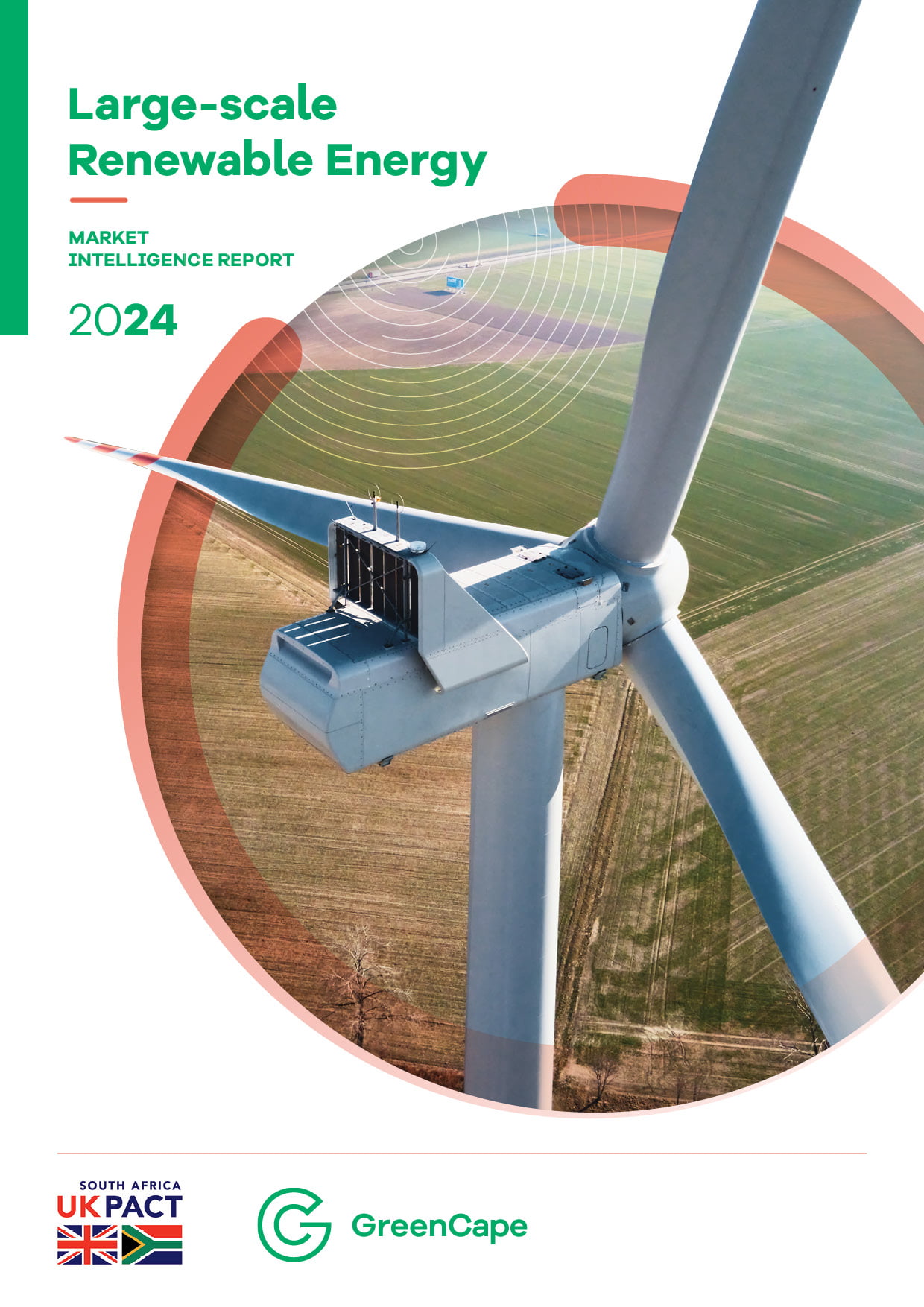GreenCape’s 2021 Market Intelligence Reports, produced in partnership with the Western Cape Government’s Department of Economic Development and Tourism, are now available for download online. Click here for MIR 2021 documents. Click here for overview video. Watch the 15 June 2021 webinar here: “Unpacking current green economy investment opportunities in the Western Cape”.
GreenCape’s Market Intelligence Reports (MIRs), developed annually in partnership with the Western Cape Government’s Department of Economic Development and Tourism, highlight the investment opportunities in key sectors of the green economy in the province.
“The Western Cape is open for business and offers investors an abundance of opportunities available across a variety of sectors in the Western Cape, including the green economy. We have been working hard to ensure the province is an attractive destination for investors looking to start or expand their businesses, highlighting the fact that not only are we a beautiful place to visit but we offer world-class infrastructure, a highly skilled talent pool and an enabling environment for businesses to thrive,” said Minister David Maynier, Western Cape Minister of Finance and Economic Opportunities. “The annual GreenCape Market Intelligence Reports provide up-to-date
insights to help investors understand the emerging opportunities to invest in the green economy, which will ensure we save jobs, rebuild the economy and create an energy secure future in the Western Cape,” he added.
GreenCape’s sector desks are in the unique position to gather current insights from businesses active in the green economy, as well as from other key role-players in each of the sectors. The MIRs are focused on highlighting opportunities in the Western Cape, and they also include relevant national insights and context.
The 2021 MIRs include updated investment opportunities and highlight the relevant legislation context and potential market barriers and risks in: Energy Services, Utility Scale Renewable Energy, Electric Vehicles and Water.
GreenCape also publishes a Sustainable Agriculture MIR in partnership with the Western Cape Department of Agriculture and a Waste MIR in partnership with the City of Cape Town.
Energy Services
Download the Energy Services 2021 MIR here.
Watch the opportunities summary video here.
The term ‘energy services’ is used to describe two key energy market segments in the South African energy space, namely (i) small-scale embedded generation (SSEG), which includes rooftop solar photovoltaic (PV) systems and energy storage, and (ii) energy efficiency. These market segments are increasingly bolstered by offerings in the energy finance sector, which in and of themselves also present opportunities to financial investors.
Highlights: The 2021 Energy Services MIR provides potential investors in the small scale embedded generation, energy storage and energy efficiency markets with a greater understanding of market opportunities in South Africa, taking into account the size of the opportunities, the level of risk involved, and current barriers. In Chapter 4, the MIR expands on estimated market size, drivers and barriers.
“In the 2021 Energy Services MIR we unpack small scale embedded generation opportunities pertaining to rooftop PV model diversification for the commercial and industrial sectors, solar power purchase agreements, solar PV for energy resellers and in-house capacity building,” said Argon Poorun, GreenCape Energy Analyst.
With 24 Western Cape municipalities that allow small-scale embedded generation, and 19 municipalities that have regulator-approved feed-in tariffs, the province is home to a large portion of the more than 1.4GW of rooftop solar PV that is installed on private and public buildings in South Africa.
“Behind-the-meter battery storage provides an emerging investment opportunity in the energy storage market, and in the energy efficiency market we elaborate on opportunities for smart metering and demand side management, as well as aggregated interventions for commercial new builds and retrofits,” added Poorun.
Utility Scale Renewable Energy
Download the Utility Scale Renewable Energy 2021 MIR here.
Watch the opportunities summary video here.
Highlights: The 2021 Utility Scale Renewable Energy MIR is compiled for foreign direct and local investors that are looking to invest directly in the South African green economy through project development, asset management, equity, debt, equipment manufacture, or support services. It highlights market opportunities in the utility-scale renewable energy market in South Africa. In Chapter 4, the MIR expands on estimated market size, drivers and barriers.
“In the 2021 MIR we highlight the investment opportunities that tap into the continuation of the REIPPPP based on the IRP 2019 allocations, increased local manufacturing of renewable energy components and systems, distributed generation, and utility-scale battery energy storage development and deployment,” said Mandisa Mkhize. “A big movement in the sector is the announcement of the opening of the REIPPP Bid Window 5. This procurement round presents an opportunity for the industry to re-ignite some of the renewable energy value chain capabilities and investor confidence eroded during the delay periods. It translates into an opportunity of 2 600 MW of new generation capacity, including 1 600 MW from onshore wind energy and 1 000 MW
from solar photovoltaic power plants,” she added.
Over 60% of the project developers that have been successful on the REIPPPP rounds are based in Cape Town, and this ecosystem of skills makes the region particularly attractive to the professional skills associated with the renewable energy space.
Electric Vehicles
Download the Electric Vehicles 2021 MIR here.
Watch the opportunities summary video here.
Highlights: Investment opportunities relating to local manufacturing and electrification of public transport, local lithium-ion battery production, local passenger vehicle manufacturing, as well as EV use in construction, retail, and in underground mining. In Chapter 4, the MIR expands on estimated market size, drivers and barriers.
“There are several emerging opportunities in the South African EV market for local investors and investors looking to enter the South African electric mobility market. We highlight investment opportunities relating to local manufacturing and electrification of public transport, local lithium-ion battery production, local passenger vehicle manufacturing, as well as EV use in construction, retail, and in underground mining,” said Wilberforce Chege.
The automotive sector is a key player in the country’s economic landscape, contributing 6.4% of GDP and 27.6% of manufacturing output. Total revenue from this sector was more than R500 billion (US$35.6 billion) in 2019, with the industry employing up to 900 000 people directly and indirectly. As this market makes a marked shift towards sustainable mobility, specifically, electric vehicles, the Western Cape Atlantis Special Economic Zone for Green Technologies can become a key hub for sustainable mobility in Africa.
Water
Download the Water 2021 MIR here.
Watch the opportunities summary video here.
Highlights: Opportunities in the municipal water market in South Africa. The report goes into depth about opportunities in water conservation and water demand management (non-revenue water – NRW reduction); alternative sanitation (non-sewered sanitation systems – NSSS); and resource recovery (beneficiation or alternative disposal of wastewater sludges).
In Chapter 4, The MIR expands on estimated market size, drivers and barriers. “Reducing non-revenue water losses is important for achieving water security and reliability of supply, as well as municipal revenue recovery for maintenance, and for off-setting future capital expenditure. Investing in NRW could realise savings of R7.3 billion per year in bulk water costs,” said Ashton Mpofu, water sector analyst at GreenCape. “Non-sewered sanitation systems can address the challenge of delivering sustainable sanitation services in new property developments, rural communities, and low-income and informal settlements, with the investment potential of R41.4 billion estimated in order to achieve universal access to safe sanitation,” he added.
“Beneficiation or alternative disposal solutions for wastewater sludges must be developed due to the national ban on liquid wastes at landfills which was put in place in August 2019,” said Rudi Botha, water sector analyst at GreenCape. “There are opportunities to transport and beneficiate sludge to the value of about R330 million per year across all metros, excluding Tshwane, with approximately R86 million in the Western Cape,” she added.
Sustainable Agriculture
Download the Sustainable Agriculture 2021 MIR here.
Watch the opportunities summary video here.
Highlights: Smart farming applications; undercover farming, which includes low-tech
infrastructure such as shade netting and higher-tech controlled environment agriculture systems; regenerative agriculture; and renewable energy. In Chapter 4, the MIR expands on estimated market size, drivers and barriers. “The agricultural sector plays a significant role in South Africa’s economy. The South African agriculture sector offers numerous opportunities for investors, agricultural and green technology manufacturers, service providers, distributors, and others in the value chain” said Tokelo Shai,
Sustainable Agriculture analyst at GreenCape.
“South Africa is largely classified as semi-arid. It has limited arable land (~12% of land-cover) and low average annual rainfall (close to half of the global average), which constrains agricultural production. However, sustainable agricultural practices and technologies are able to mitigate against these resource scarcities and improve yields. Regenerative agriculture practices are enabled by investment into no-till farming equipment, and the current market size for this machinery is estimated to be R108 million. Undercover farming is growing globally, and while high-tech systems in South Africa have not taken off as rapidly, we have seen significant growth in low-tech systems such as netting and tunnels, with the market size of the low-tech systems
estimated to be R6 billion. Smart farming continues to see uptake in South Africa, with remote sensing applications and communications software as an emerging market. Finally, with rapidly rising electricity tariffs and persistent load shedding, agricultural renewable energy applications, such as small-scale embedded generation, solar powered irrigation systems, distributed generation, energy storage and biogas, are seeing strong investment trends. The business case for solar PV in the agricultural sector is excellent, and the installed capacity of solar PV is estimated to be 200MWp, growing by 50 – 80 MWp over the past 12 months. We expect this trend to continue into the future,” she added.
Waste
Document will be online July 2021
Watch the insights summary video here.
Highlights: “Opportunities within the organics, plastic and e-waste sectors have the potential to add between R0.5 and R1.1 billion in value to the Cape Town economy,” said Sam Smout, Waste Sector Analyst at GreenCape. “According to the then Department of Environmental Affairs, the waste economy contributed ~R24.3 billion to the South African GDP in 2016 (DEFF, 2017). It provided 36 000 formal jobs and supported ~80 000 informal jobs/livelihoods. It was estimated that a further R11.5 billion per year could be unlocked by 2023 by diverting up to 20 million tonnes of waste from landfill. The anticipated benefits could include 45 000 additional formal jobs and 82
000 indirect jobs, as well as the creation of 4 300 SMMEs,” he added.
The 2021 MIRs are now available for free online from www.green-cape.co.za


